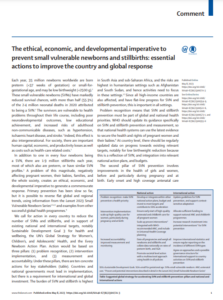
Each year, 35 million newborns worldwide are born preterm (<37 weeks of gestation) or small-forgestational age, and may be low birthweight (<2500 g). These small vulnerable newborns (SVNs) have markedly reduced survival chances, with more than half (55·3%) of the 2·4 million neonatal deaths in 2020 attributed to being a SVN. The survivors are vulnerable to health problems throughout their life course, including poor neurodevelopmental outcomes, low educational achievement, and increased risks of adulthood non-communicable diseases, such as hypertension, ischaemic heart disease, and stroke. Indeed, this effect is also intergenerational. For society, there are important human capital, economic, and productivity losses as well as costs such as health-care related costs.